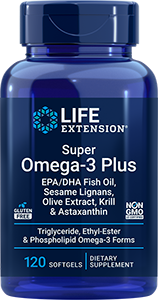
Is Fish Oil Good for Your Heart? Here’s What Omega-3s Really Do
Published: January 2022 | Updated: December 2025
At a Glance
- Fish oil is rich in EPA and DHA, two omega-3 fats shown to support cardiovascular health.
- These omega-3s help maintain already-healthy triglyceride levels, support a healthy inflammatory response, and promote flexible, healthy blood vessels.
- Many people don't get enough omega-3s from diet alone, making supplementation a helpful tool—but it's important to choose the right dosage and EPA:DHA ratio for meaningful benefits.
If you've ever wondered whether fish oil is actually worth taking, you're not alone. Fish oil has been recommended for heart health for decades, but the real science behind it often gets lost in quick claims or snappy headlines that don't explain the connection well.
And since heart health continues to be a major concern for large percentages of Americans, according to the American Heart Association, omega-3 fats in fish oil may help play a very real role in how flexible your blood vessels are and supporting a healthy inflammatory response.
But not all fish oils work the same way, and most of us don't get enough from food alone to see meaningful benefits. Let's break down how omega-3s support heart health, the different types of omega-3s, how much you actually need, and how to choose a high-quality supplement that delivers on its promises.
What is fish oil?
Fish oil is a source of omega-3 fatty acids, a type of polyunsaturated fat that your body can't make on its own. This means we need to get omega-3s from food or supplements.
The two main omega-3s found in fish oil are called EPA and DHA. Both are found naturally in fatty fish like salmon, sardines, herring, anchovies, and mackerel. Plant-based foods like walnuts or flaxseeds contain a different type of omega-3 (ALA), but the body can only convert a small amount of ALA into EPA and DHA, which means that people who don't eat fatty fish (vegans and people who simply aren't fans of it) will need to get omega-3s directly from fish oil supplements for heart health. Those following a vegan diet can supplement with an algae-based omega-3 supplement.
Even though they're both omega-3s, EPA and DHA play different roles in the body:
- EPA (eicosapentaenoic acid) is more active in the bloodstream and supports a healthy inflammatory response.
- DHA (docosahexaenoic acid) is 250-300 times more concentrated in brain and nerve tissue than EPA and supports the structure of cell membranes, including those in the heart.
So when we talk about fish oil being "good for your heart," we're really talking about the combined effects of EPA and DHA, and how they impact the heart, blood vessels, and healthy inflammatory response in the body. Both are important for supporting healthy lipids, particularly triglycerides. Together, EPA and DHA both help your cells stay flexible, which matters because stiff, rigid cells can make it harder for blood to flow smoothly or for the cardiovascular system to respond to everyday stress.
Why is fish oil good for your heart?
One of the most important things omega-3s do is help keep the cell membranes in your blood vessels flexible. Think of your blood vessels like a system of tiny tubes. When these tubes are healthy and flexible, blood flows smoothly.
Imagine you have a door hinge that's gotten stiff over time. Our blood vessels can become stiff with lifestyle choices that make it harder for blood flow to pump freely in the body. Now imagine you add oil to the rigid door hinge, and it starts to move more smoothly with less resistance. Omega-3s work similarly in your cardiovascular system. They help keep blood vessels supple and responsive, rather than rigid.
What are the key benefits of fish oil for heart health?
The link between omega-3s and a healthy cardiovascular system is well-documented in the research. Omega-3s support heart health in several key ways:
1. Supports healthy triglycerides
Triglycerides are a type of fat that circulate in your bloodstream and serve as a major energy source, but more isn't better. Research has consistently shown that omega-3 supplementation helps maintain healthy triglyceride levels, especially when taken at clinically meaningful doses.
So how does it work? EPA plays a key role in turning down the liver's triglyceride production while also helping the body clear excess fats more efficiently from the blood. This double-duty mechanism helps keep fat levels more balanced, which supports overall cardiovascular health.
In short: EPA and DHA help your body maintain a cleaner environment in your bloodstream which is great news for your heart health.
2. Supports already-healthy blood pressure and circulation
Your heart pumps blood through a vast network of vessels, and for that system to work efficiently, the vessels need to stay flexible and responsive.
Omega-3s help your blood vessels stay supple, kind of like oiling a squeaky hinge so it moves more freely. Both EPA and DHA support the inner lining of blood vessels by helping them relax and expand more easily, a process called vasodilation.
A large review of 22 studies has shown that omega-3s improve a measure known as flow-mediated dilation, which reflects how well your blood vessels respond to increased blood flow. Plus, other research shows omega-3s activate specific ion channels in the vascular wall that help relax the muscle layer and reduce resistance.
Ultimately, this means that omega-3s help your blood flow more easily, keep your vessels more elastic, and as a result, your heart doesn't have to work quite so hard.
3. Supports a healthy inflammatory response
Omega-3s help with keeping this internal process in balance rather than letting it run unchecked. In particular, EPA has been highlighted in research for its ability to maintain a healthy inflammatory response in the blood vessels. And both EPA and DHA have been shown to maintain markers of vascular health, including cytokines, C-reactive protein (known as CRP), and leukocyte activity.
Smooth, resilient arteries in turn support your blood vessel integrity and also the heart's ability to handle physical strain and stressors.
EPA vs. DHA: The Two Heart-Healthy Omegas
| Omega-3 Type | Main Function | Heart Benefit | Best Source |
|---|---|---|---|
| EPA | EPA is more prominent in the circulation and is a precursor to eicosanoids which support a healthy inflammatory response. |
|
Mackerel, herring, anchovies, and shad |
| DHA | Highly concentrated in neural tissues, especially in the brain and retina. Plays an important role in cognitive function. |
|
Tuna and sardines |
Explore Our Best Heart Health Supplements
How much fish oil do you need for heart support?
When it comes to heart health, the right amount of omega-3s isn't a one-size-fits-all number. Your omega-3 needs will depend on your diet pattern and your current blood levels.
That's why many experts recommend using a simple blood test called the Omega-3 Index, which measures the percentage of EPA and DHA in your red blood cells. Life Extension recommends a score between 8–12% is associated with optimal cardiovascular health.
Most people fall well below that range, especially if they're not eating fatty fish regularly. That's where supplementation can make a meaningful difference in closing the nutrient gap. Aim for a daily dose of 2,000 to 4,000 mg of total omega-3s, ideally providing 700 to 1,400 mg of EPA and 500 to 1,000 mg of DHA. This range is designed to help most people reach the target Omega-3 Index above 8%.
How to choose a quality fish oil supplement
Not all fish oil supplements are nutritionally equivalent. Purity, potency, and freshness matter. Look for fish oil products that participate in the International Fish Oil Standards (IFOS) Program—the gold standard for third-party testing of omega-3 products. The benefit of looking for that IFOS certification is the fish oil will be guaranteed to be tested for contaminants (like mercury and PCBs), freshness, and omega-3 content.
As a registered dietitian, my recommendation is Super Omega-3 EPA/DHA Fish Oil, which delivers one of the highest doses of EPA and DHA available in a single formula, making it easier to support healthy blood levels for heart and brain support. In addition to supporting already-healthy triglyceride and HDL cholesterol levels, this supplement includes olive extract for heart-healthy polyphenols and sesame lignans to help the fatty acids remain stable.
Together, these ingredients make Super Omega-3 a great option for anyone serious about cardiovascular and cognitive wellness. It's an easy way to bridge the nutritional gap between diet and optimal omega-3 intake, especially for those who don't eat fatty fish regularly or want extra support for vascular function and long-term heart health.
Is it better to get omega-3s from supplements or fish?
While fatty fish like salmon and sardines are great sources of omega-3s, it's difficult to reach the optimal omega-3 index through diet alone, especially if you don't eat fish multiple times a week. A high-quality supplement helps ensure you get enough EPA and DHA to support heart health.
What's the difference between EPA and DHA in fish oil?
DHA is more concentrated in the brain and nervous system, playing a key role in cognitive health. It also supports heart health by promoting nitric oxide production and helping maintain healthy blood vessel function. Both EPA and DHA support a healthy inflammatory response and arterial health.
When is the best time to take fish oil?
There's no perfect time, but some research suggests taking fish oil in the morning may offer slight advantages. For best results, consider splitting your dose: take half in the morning and half in the evening to support steady omega-3 levels throughout the day.
Take a heart health supplement quiz to learn which nutrients may be right for you.
Key Takeaways
- Omega-3s like EPA and DHA, found in fatty fish and fish oil supplements, are well studied for helping maintain already-healthy levels of lipids like HDL and triglycerides and supporting already-healthy blood pressure.
- Both EPA and DHA are great for heart health and supporting a healthy inflammatory response, while DHA plays a big role in brain and nervous system health.
- Aim for 2,000–4,000 mg of omega-3 fish oil daily, ideally providing 700–1,400 mg EPA and 500–1,000 mg DHA.
References
- Bercea CI, et al. "Omega-3 polyunsaturated fatty acids and hypertension: a review of vasodilatory mechanisms of docosahexaenoic acid and eicosapentaenoic acid." Br J Pharmacol. February 2021. https://pubmed.ncbi.nlm.nih.gov/33283269/
- Harris WS. "The omega-3 index as a risk factor for coronary heart disease." Am J Clin Nutr. June 2008. https://pubmed.ncbi.nlm.nih.gov/18541601/
- Innes JK, Calder PC. "The Differential Effects of Eicosapentaenoic Acid and Docosahexaenoic Acid on Cardiometabolic Risk Factors: A Systematic Review." Int J Mol Sci. February 2018. https://pubmed.ncbi.nlm.nih.gov/29425187/
- Konishi T, et al. "Time-of-day effects of consumption of fish oil-enriched sausages on serum lipid parameters and fatty acid composition in normolipidemic adults: A randomized, double-blind, placebo-controlled, and parallel-group pilot study." Nutrition. October 2021. https://pubmed.ncbi.nlm.nih.gov/33962365/
- Li K, et al. "Effect of marine-derived n-3 polyunsaturated fatty acids on C-reactive protein, interleukin 6 and tumor necrosis factor α: a meta-analysis." PLoS One. February 2014. https://pubmed.ncbi.nlm.nih.gov/24505395/
- Martin SS, et al. "2025 Heart Disease and Stroke Statistics: A Report of US and Global Data From the American Heart Association." Circulation. January 2025. https://www.ahajournals.org/doi/10.1161/CIR.0000000000001303
- McDonnell SL, et al. "Cross-sectional study of the combined associations of dietary and supplemental eicosapentaenoic acid + docosahexaenoic acid on Omega-3 Index." Nutr Res. November 2019. https://pubmed.ncbi.nlm.nih.gov/31757628/
- Pisaniello AD, et al. "Omega-3 fatty acids ameliorate vascular inflammation: A rationale for their atheroprotective effects." Atherosclerosis. May 2021. https://pubmed.ncbi.nlm.nih.gov/33812168/
- Safaei P, et al. "Comparison of fish oil supplements and corn oil effects on serum lipid profile: a systematic review and meta-analysis of randomized controlled trials." Syst Rev. February 2024. https://pmc.ncbi.nlm.nih.gov/articles/PMC10840298/
- Shahinfar H, et al. "A systematic review and dose response meta analysis of Omega 3 supplementation on cognitive function." Sci Rep. August 2025. https://pubmed.ncbi.nlm.nih.gov/40836005/
- Yamagata K. "Docosahexaenoic acid regulates vascular endothelial cell function and prevents cardiovascular disease." Lipids Health Dis. June 2017. https://pubmed.ncbi.nlm.nih.gov/28619112/
- Zehr KR, Walker MK. "Omega-3 polyunsaturated fatty acids improve endothelial function in humans at risk for atherosclerosis: A review." Prostaglandins Other Lipid Mediat. January 2018. https://pmc.ncbi.nlm.nih.gov/articles/PMC5803420/
Always be in the know!
Access the latest deals, wellness news, expert health tips & more!










